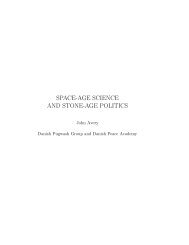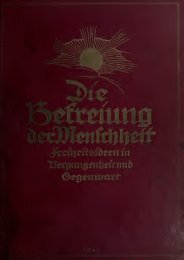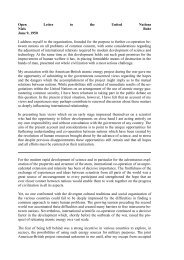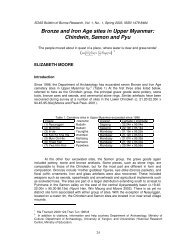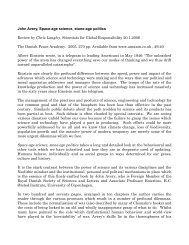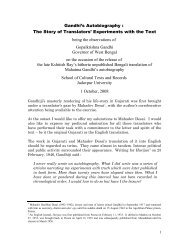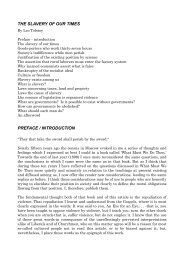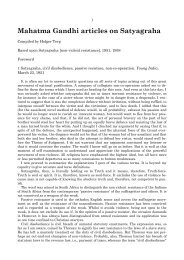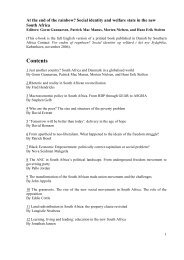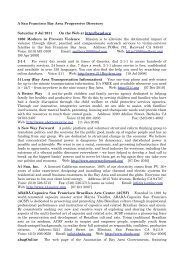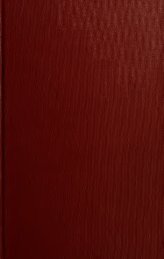Untitled
Untitled
Untitled
You also want an ePaper? Increase the reach of your titles
YUMPU automatically turns print PDFs into web optimized ePapers that Google loves.
K~^
THE UNITED STATES AND<br />
THE EXPANSION OF THE<br />
LAW BETWEEN NATIONS<br />
THOMAS WILLING BALCH<br />
Member of the Philadelphia Bar<br />
The American Philosophical Society, etc.<br />
REPRINTED FROM UNIVERSITY OF PENNSYL VANIA<br />
LAW REVIEW, VOL. 64, DECEMBER, i 9 i5<br />
Copvright by University of Pennsylvania<br />
1915
THE UNITED STATES AND<br />
THE EXPANSION OF THE<br />
LAW BETWEEN NATIONS<br />
THOMAS WILLING BALCH<br />
Member of the Philadelphia Bar<br />
The American Philosophical Society, elc.<br />
REPRINTED FROM UNIVERSITY OF PENNSYLVANIA<br />
LAW REVIEW, VOL. 64, DECEMBER, 1915<br />
Copyright by University of Pennsylvania<br />
1915
(^<br />
3t^\<br />
,\)
THE UNITED STATES AND THE EXPANSION OF THE<br />
LAW BETWEEN NATIONS. 1<br />
Since the Great War began, in which, counting<br />
the Grand<br />
Duchy of Luxembourg and the Republic of San Marino, fifteen<br />
states are engaged at the time this article is written, and which<br />
embraces in its area much more than half the land of the earth,<br />
the rules and customs of the Law of Nations have been buffeted<br />
about very much both upon the land and the sea. In this state<br />
of tumult upon both land and sea, the United States of Amer-<br />
ica, as the chief of the neutral nations, have again, as on several<br />
previous occasions in the past, striven not only to perform with<br />
impartiality their duties as a neutral state, but also to uphold<br />
their rights according to the Law of Neutrality. For it must<br />
not be lost sight of, as many people do, that under the Law of<br />
Neutrality neutrals have rights which they can maintain, as well<br />
as duties which they must perform. The stand taken by Amer-<br />
ica in behalf of neutral rights during the present war, under<br />
the leadership of President Wilson and Secretary Lansing, will<br />
undoubtedly affect in some measure, impossible now of predic-<br />
tion, the future development of public international law. It<br />
would seem appropriate then, to point out briefly the influence<br />
which the United States, since they declared their independence<br />
one hundred and thirty-nine years ago, have exerted in shaping<br />
and moulding, in some important particulars, the development<br />
of the Law between Nations.<br />
In colonial days a few copies of Grotius in Latin and like-<br />
wise some copies of Puffendorf, most of them probably in Latin<br />
too, found their way to the British North American colonies.<br />
Thus the Library Company of Philadelphia, founded in 1731<br />
by Franklin, ordered in March, 1732, an English translation of<br />
i<br />
lt is to the Chancellor d'Aguesseau that is due the name, Droit entre<br />
les gens.<br />
326983
2 U. S. AND EXPANSION OF LAW BETWEEN NATIONS<br />
Puffendorf's work, "Law of Nature, etc." 2 That library also<br />
some years later obtained an English translation of the book<br />
of the Swiss publicist, J. J..Burlemarqui, The Principles' of Nat-<br />
ural Law, published at London in 1758. 3<br />
When the struggle between the colonies and the mother<br />
land had become an actuality, the need for "the latest word" as<br />
to what was the Law between Nations, undoubtedly was felt<br />
of the united colonies. And<br />
by the men who directed the policy<br />
so to Charles Guillaume Frederic Dumas, belongs in large meas-<br />
ure the honor, apparently, of sending over from Europe, where<br />
modern international law was born in the early part of the sev-<br />
enteenth century, across the Atlantic Ocean to the newly form-<br />
ing thirteen American nations, the law binding between nations.<br />
For Dumas sent from The Hague to Franklin at Philadelphia,<br />
two copies 4 of the new edition of the celebrated treatise of the<br />
Swiss, Emer de Vattel, of Neuchatel, Le Droit des Gens ou<br />
5<br />
Principes de la Loi Naturelle. This new edition was published<br />
at The Hague in 1775 and edited by Dumas. Vattel's work<br />
was known at that time not only to every one in Europe who<br />
professed any knowledge of the Law of Nations, but also was<br />
looked upon in the foreign offices of the European powers as the<br />
leading treatise upon the subject. And even today Vattel's<br />
treatise is continually cited by publicists in their writings, and<br />
by lawyers before the courts in disputes turning upon the proper<br />
application of the Law of Nations.<br />
One of the two copies of Vattel which Dumas sent to<br />
Franklin, the sage of Philadelphia presented in Dumas's<br />
2 Albert J. Edmunds: The First Books Imported by America's First<br />
Great Library, 1732, Pennsylvania Magazine of History and Biography, Phil-<br />
adelphia, 1906, p. 301.<br />
"Concerning the colonization of the thirteen colonies and the influence<br />
of European publicists on American thought, see Thomas Balch : Les Francais<br />
en Amerique Pendant la Guerre de l'lndependance des Etats-Unis, 1777-1783,<br />
Paris, 1872; Sydney George Fisher: The Struggle for American Independence,<br />
Philadelphia, 1908; and Paul Fredericq of Ghent, an open letter in the<br />
Journal de Geneve, July 10, 1909.<br />
432.<br />
4 Albert Henry Smyth: Benjamin Franklin, New York, 1906, Vol. VI, p.<br />
5<br />
Vattel's work was first published in 1758.
U. S. AND EXPANSION OF LAW BETWEEN NATIONS 3<br />
name to the Library Company of Philadelphia which Franklin<br />
had been instrumental in establishing in 1731. Among the<br />
records of the directors of the library, there is this interesting<br />
minute: "Oct. 10, 1775. Monsieur Dumas having presented<br />
the Library with a very late edition of Vattel's Law of Nature<br />
and Nations (in French), the Board direct the secretary to re-<br />
turn that Gentleman their thanks."<br />
Franklin tells us that this copy was much used by the mem-<br />
bers of the First Continental Congress. This same copy un-<br />
doubtedly was used by some of the members of the Second<br />
Continental Congress, which sat at Philadelphia; by the leading<br />
men who subsequently directed the policy of the united colonies<br />
until the end of the war; and later by the men who sat in the<br />
Constitutional Convention of 1787-89 and framed the Constitution<br />
of the United States. For in those days the library was<br />
housed in Carpenter's Hall where the First Continental Con-<br />
gress deliberated and within a stone's throw almost of where the<br />
Second Continental Congress met in the Colonial State House<br />
of Pennsylvania, and likewise near where the men who framed<br />
the Constitution held their discussions and where the Supreme<br />
Court of the United States first held court. 6<br />
That copy of<br />
Vattel surely was well known to the early fathers of the Re-<br />
public, some of whom read French with ease. And as it is ex-<br />
pressly stated in the Constitution that the Law of Nations<br />
forms part of the law of the land, thereby making international<br />
law part of the law which American courts must take cognizance<br />
of and interpret when they give decisions, it is easily seen<br />
that Vattel had a very appreciable influence in shaping the attitude<br />
of the United States of America towards the Law of Na-<br />
tions from their very beginning as a confederation of thirteen<br />
newly constituted members of the family of nations until they<br />
agreed by the adoption of the present Constitution to merge<br />
themselves into the single and much greater single member of<br />
the family of nations, the present United States of America.<br />
"<br />
George Maurice Abbott : A Short History of the Library Company of<br />
Philadelphia, Philadelphia, 1913, p. IX.
4 U. S. AND EXPANSION OF LAW BETWEEN NATIONS<br />
Another copy of Vattel's work which Dumas sent to Frank-<br />
lin is in the library of Harvard University. Franklin sent it in<br />
the summer of 1776 to James Bowdoin, afterwards Governor of<br />
Massachusetts and a member of the Constitutional Convention<br />
of 1787-89. Bowdoin presented it to Harvard College in<br />
Franklin's name. But it should have been recorded as the gift<br />
of Dumas, for it was at Dumas's wish that Franklin sent it to<br />
Harvard College. In this Harvard copy there is written in a<br />
French hand, apparently before it was pesented to Harvard University,<br />
the following commentary which is of remarkable interest<br />
for the then young North American Confederation. Probably<br />
it was written by Dumas with his own hand. But whether<br />
it was original with him or was taken from the writings of one<br />
of the sages who have in different climes and various epochs<br />
commentated upon the manner and form of government of<br />
mankind, it is not as yet possible<br />
to determine.<br />
This French commentary begins with the caption, "A note<br />
of the Editor" (sic), apparently in the same handwriting as the<br />
note itself, which is as follows:<br />
"77 est des peuples genereux et magananimes, que leurs vertu<br />
rendra avec le temps des Etats absolument independants & autonomes.<br />
'Mes chers Amis (leur dira alors quelque Sage) Vous ne<br />
sauries mieux faire que d'adopter chez vous la Constitution Angloise,<br />
moyennant un petit changement qui, selon moi, pourra rendre<br />
plus parfaite cette forme de Gouvernement inixte, si heureusement<br />
temperee. Ce changement est de n 'avoir ni royaute, ni noblesse, ni<br />
Senat hereditaires. L'on pent tout aussi peu heriter de I'art de<br />
gouverner les hommes, que de celui de les guerir, ou de leur apprendre<br />
a penser, a chanter, a danser. Gardez vous cependant de<br />
rendre votre Gouvernement electif; ce seroit encore pire: ce ne<br />
seroient presque jamais les meilleurs ni les plus sages, mais les<br />
plus forts & les plus mechants qui vous conduiroient. Qui nous<br />
designera done les Peres de la Patrief Eh! mes Amis, e'est la Nature,<br />
qui de tout temps les a montres du doigt aux premieres Societes;<br />
& les Societes suivantes ont toujours ete aveugles, & sourdes<br />
a la voix de la nature. Les plus ages d'entre vos Peres de families*<br />
fonciers, voila les seuls Rois, s'il en faut, les seuls Senateurs, les seuls<br />
Seigneurs (Seniores) dignes de Vous. Vous les tirerez de la char-<br />
rue; Us y laisseront leurs fils; & I' age avance seul conciliera a ces<br />
derniers le respect & la veneration de vos petits-fils & de vos arriere-<br />
petits-fils, avec le droit s'ils se trouvent les aines de toute la nation,<br />
de la conduire a leur tour' "
U. S. AND EXPANSION OF LAW BETWEEN NATIONS 5<br />
A foot-note to the original manuscript text is as follows: "*J'appelle<br />
fonciers les prossesseurs des terres."<br />
The above sage counsel as to the best manner of forming<br />
the new government that was necessary to hold the colonies to-<br />
gether, when read in the light of the history of the subsequent<br />
one hundred and thirty-nine years which have elapsed since the<br />
volume was presented to Harvard University, is certainly a<br />
prophetic comment on the development of our political institutions.<br />
Thus in it, Lincoln, Grant and Cleveland loom up. And<br />
also a suggestion of the decadence of the personnel of parliamentary<br />
government the world over as a result of manhood suf-<br />
frage is made in it. Whether Dumas wrote the passage or<br />
quoted it from some other publicist, the author of it, whoever he<br />
was, was evidently a scholar well versed in the past experiences<br />
of the human race in its efforts to solve the complex problem of<br />
the art of government. Doubtless that commentary was read<br />
not only by Franklin and Bowdoin, but also by some of the<br />
other statesmen who helped to mould the institutions of the<br />
United States.<br />
As the Law of Nations was thus literally sent across the<br />
Atlantic Ocean to the new budding thirteen nations by a Hollander<br />
residing at The Hague, in the treatise of a famous Swiss<br />
publicist, a treatise which was recognized at that time all over<br />
Europe as the leading authorative work upon the Law of Nations,<br />
as the Swiss Confederation up to that time had done more<br />
by its foreign policy to develop the actual practice of neutrality<br />
than any other power, and as Vattel had stated the conception<br />
of neutrality, probably more clearly than any publicist up to the<br />
time that he wrote, it was eminently fitting and logical that the<br />
young nation which resulted from the blending of the thirteen<br />
colonies upon the adoption and ratification of the Constitution<br />
of 1787-89, separated from Europe and its quarrels by the<br />
broad Atlantic, should do much to develop and make more pre-<br />
cise the Law of Neutrality. Indeed it is not risking much to say<br />
that the policy of neutrality practiced by the United States and<br />
demanded by them of other nations has been the most potent<br />
single factor to shape the Law of Neutrality as we have it today.
6 U. S. AND EXPANSION OF LAW BETWEEN NATIONS<br />
During the middle ages it was considered perfectly proper<br />
for one feudal potentate to allow another feudal prince to march<br />
his troops across the territory<br />
of the former lord in order to<br />
attack a third prince and his possessions, without the sovereign<br />
whose lands were used as a highway for the purposes of the<br />
attack being considered involved in the struggle in any way.<br />
The belligerents were merely making use of the public highways.<br />
As the feudal holdings were slowly consolidated into the<br />
European powers, more or less roughly in several instances upon<br />
the basis of nationality, questions gradually grew out of the<br />
political policy of the newly forming states, while at the same<br />
time the questions that related to the conduct of individual lords<br />
or nobles became of less and less importance. As the former<br />
and newer class of questions gained in prominence with the<br />
gradual change from the feudal system to the newer idea of<br />
centralized monarchies as the basis of the political divisions of<br />
Europe, the questions relating to the conduct of individuals became<br />
more and more insignificant and dropped gradually into<br />
the background. But the idea of one potentate preserving what<br />
is meant today by neutrality when others were engaged in war,<br />
was practically not understood until Vattel's time; and even he<br />
did not state it with all the fullness that the word neutrality<br />
means today as a term of international law.<br />
Grotius in his immortal work, De Jure Belli ac Pacis, published<br />
in 1625, said, according to Westlake's rendering, that<br />
"the duty of those who keep aloof from a war is to do nothing by<br />
which the one whose cause is bad may be strengthened, or the movements<br />
of him who is engaged in a just war may be impeded, but in<br />
a doubtful case to treat the two parties equally in allowing passage,<br />
in furnishing supplies to their armies, and in abstaining from the<br />
relief of besieged forces." 7<br />
Thus in the absence of a benevolent neutrality which the father<br />
of the Law of Nations urged at the end of the first quarter of<br />
the seventeenth century, he taught equality of treatment for<br />
both belligerents. And Bynkershoek in his Quaestiones Juris<br />
T<br />
Liber 3, c. 17, 3.
U. S. AND EXPANSION OF LAW BETWEEN NATIONS 7<br />
Publici, published in 1737, upheld Grotius in maintaining equality<br />
of treatment of the belligerents as the test of judging neutral<br />
duties. 8<br />
Vattel, however, in the latter half of the eighteenth<br />
century, maintained that the real test of neutrality was for a<br />
neutral state to abstain from taking part in the war, except in<br />
so far as it was bound by a former treaty<br />
ligerents. 9<br />
to aid one of the bel-<br />
Thus the publicists progressed slowly on the road to the<br />
present day well developed idea of neutrality. A decided impulse<br />
toward the acceptance of some of the rules that now<br />
govern the relations of neutrals and belligerents on the sea was<br />
begun under the leadership of the great Catharine and her<br />
advisors, by an association of a number of the European na-<br />
tions in 1780, a league since known to history as the First<br />
Armed Neutrality.<br />
The most important impulse, however, to the expansion of<br />
the Law of Neutrality was to come from the young Republic of<br />
the west, in the last decade of the eighteenth and in the first<br />
quarter of the nineteenth century.<br />
The policy of neutrality set up and enforced by the United<br />
States with Washington as President and Jefferson as Secre-<br />
tary of State, during the war waged between France on the<br />
one side and Great Britain and several other states on the other<br />
side, shortly after the founding of the first republic in<br />
France, defined much more clearly than had been the case in the<br />
past, what might and might not be done on neutral territory in<br />
behalf of belligerents.<br />
The French Republic declared war against Great Britain,<br />
Holland and Spain, February 1st, 1793. With the aim of<br />
guarding the American Republic against<br />
needless embroilment<br />
in the struggle, President Washington on April 22nd, issued his<br />
now justly famous proclamation declaring the neutrality of the<br />
United States of America and warning American citizens not<br />
"Liber 1, c. 9. See also Du Ponceau's translation of the first book of<br />
this work, published at Philadelphia in 1810 under the title, "A Treatise of<br />
the Law of War," Chapter 9.<br />
Liber 3, 104.
8 U. S. AND EXPANSION OF LAW BETWEEN NATIONS<br />
to give aid to either side in contravention of that proclamation<br />
and the Law of Nations. 10 And that proclamation was illumi-<br />
nated by Jefferson in various state papers which he addressed<br />
either to the ministers in America of the belligerent governments,<br />
or else sent through the intermediary of the American<br />
representatives abroad to the belligerent governments.<br />
In corresponding with the French minister to America,<br />
Monsieur Genet, Jefferson had occasion to expound some points<br />
of the Law of Neutrality which arose in the relations between<br />
the two republics. For, upon landing April 8th, 1793, at<br />
Charleston, South Carolina, two weeks before Washington is-<br />
sued his neutrality proclamation, the new envoy sent by the<br />
French Government to the American Government at Philadel-<br />
phia, Monsieur Genet, acting on the theory of neutrality that<br />
had prevailed in the past when it was perfectly proper for a<br />
belligerent to march troops across the territory<br />
of a neutral<br />
state, to make war upon another belligerent, at once began to<br />
arm and commission several vessels and then send them out to<br />
sea to prey upon the maritime commerce of Great Britain, a<br />
state with whom America was at peace. Minister Genet also<br />
instructed the French consuls in America to act as courts of<br />
admiralty to pass upon the legality of prizes brought by French<br />
cruisers into American ports. Washington called his Cabinet<br />
together, and it decided that the commissions granted to privateers<br />
by Genet, as also the condemnation of prizes by the con-<br />
suls of France, were void. At another meeting of the Cabinet<br />
it ordered that all privateers commissioned by Genet must leave<br />
American ports, and took effective measures whereby other ves-<br />
sels that were being fitted out as French privateers were pre-<br />
vented from going out to sea.<br />
In answer to M. Genet's argument that it was a usual duty<br />
of the consuls of France to grant commissions and letters of<br />
marque to privateers, Secretary Jefferson wrote on June 5th,<br />
1793, to the envoy of France:<br />
p. 140.<br />
"American State Papers, Foreign Relations, Washington, 1833, Vol. I,
U. S. AND EXPANSION OF LAW BETWEEN NATIONS 9<br />
"It is the right of every nation to prohibit acts of sovereignty<br />
from being exercised by any other within its limits, and the duty of<br />
a neutral nation to prohibit such as would injure one of the warring<br />
that the granting military commissions, within the United<br />
powers ;<br />
States, by any other authority than their own, is an infringement on<br />
their sovereignty, and particularly so when granted to their own<br />
citizens, to lead them to commit acts contrary to the duties they owe<br />
their own country; that the departure of vessels, thus illegally<br />
will be but an<br />
equipped, from the ports of the United States,<br />
acknowledgment of respect, analogous to the breach of it, while it<br />
is necessary on their part, as an evidence of their faithful neutral-<br />
ity."<br />
Later, on August 16th, 1793, Jefferson<br />
wrote to the Amer-<br />
ican Minister at Paris, Gouverneur Morris, further in support<br />
of the right and duty of the United States to maintain its neu-<br />
trality:<br />
"The right of raising troops, being one of the rights of sovereignty,<br />
and consequently appertaining exclusively to the nation it-<br />
self, no foreign power or person can levy men within its territory,<br />
without its consent. . . . That if the United States have a right<br />
to refuse the permission to arm vessels and raise men within their<br />
ports and territories, they are bound by the laws of neutrality to<br />
exercise that right, and to prohibit such armaments and enlistment."<br />
It was soon found, however, by practical experience that<br />
the United States of America could not, under the common law<br />
as it then existed in America, effectively prevent<br />
their citizens<br />
from taking an active part in the war and thereby endangering<br />
the neutrality of the country. Gideon Henfield, an American<br />
citizen, who had taken service on a French privateer, came<br />
sailing up the Delaware in 1793 to Philadelphia, in charge as<br />
prize master of a British vessel which had been captured by the<br />
privateer. For thus disregarding the neutrality proclamation<br />
of the President, he was indicted at common law, in the fed-<br />
eral court. Although Justice Wilson in his charge to the jury,<br />
urged upon them that the defendant should do nothing that<br />
might harm his country, that under the Constitution the treaties<br />
of the United States with foreign powers were part of the law<br />
of the land, and that the United States had entered into a treaty
10 U. S. AND EXPANSION OF LAW BETWEEN NATIONS<br />
of friendship with Great Britain which was then in force, the<br />
jury, nevertheless, acquitted<br />
Henfield. 11<br />
This verdict made it clear that the municipal law then in<br />
force in the country might not be sufficient to prevent Ameri-<br />
can citizens from engaging in their own country in the service<br />
of a belligerent. President Washington and Secretary Jefferson<br />
persuaded Congress to pass the Neutrality Act of 1794.<br />
That act temporarily forbade citizens of the United States from<br />
accepting letters of marque from a belligerent state, or to enlist<br />
in America in the military forces of a foreign nation, and prohibited<br />
vessels which were intended to cruise as privateers for<br />
a foreign belligerent from fitting out and arming in American<br />
ports. Several other acts relating to the same object of preserving<br />
the neutrality of the country were enacted from time to<br />
time, until finally on April 20th, 181 8, under the influence of<br />
the wars for independence of the South American countries<br />
then in progress, Congress dealt with the subject on a comprehensive<br />
scale in the Foreign Enlistment Act which it enacted<br />
and which is still in force. That enactment led in the following<br />
year to the passage by the British Parliament of the British<br />
Foreign Enlistment Act. And when as a result of the events<br />
of the American Civil War, it became clear that the Act of 181 9<br />
was not sufficiently stringent to enforce British neutrality, it was<br />
superseded by another act in 1870 which is still in force. As<br />
Westlake justly remarks, "no state law of the kind is a declara-<br />
tion to the world of what the state in question deems to be its<br />
international duty as a neutral. It is a declaration to its own<br />
subjects of the powers which it deems necessary to take over<br />
them, whether in pursuance of its own policy or in order to<br />
ensure the performance of its neutral duty." Still the enactment<br />
of such municipal statutory law, is an indication of what<br />
the conduct of neutral nations towards belligerents should be.<br />
The precautionary measures that many governments have since<br />
11<br />
Henry Wheaton : Elements of International Law, edited, with notes,<br />
by Richard Henry Dana, Jr., Boston, 1866, p. 543, note.
U. S. AND EXPANSION OF LAW BETWEEN NATIONS 11<br />
taken by the enactment of municipal statutes to enable them to<br />
safeguard and maintain their neutrality in case of need, have<br />
resulted from the early lead that the United States of America<br />
took in such matters.<br />
The policy of neutrality as stated by Jefferson in his communications<br />
above quoted to Genet and Morris, and enforced<br />
by the United States in the war then raging between France<br />
and Great Britain, made much more clear than ever before that<br />
time what can and cannot properly be done in neutral territory<br />
in intercourse with belligerents. That policy has had a great in-<br />
fluence on the expansion of the Law of Neutrality, and even<br />
helped to gain the American legal victory before the Geneva<br />
Tribunal in 1872.<br />
If, however, under President Washington and Secretary<br />
Jefferson, the American Republic took advanced ground to perform<br />
its neutral duties, it was not less backward, if perhaps not<br />
so successful, in upholding the neutral rights of its citizens to<br />
trade with countries with which, though they happened to be<br />
belligerents, the United States were at peace and on terms of<br />
friendship.<br />
One of the most important of the state papers of Jefferson,<br />
upholding the right of American citizens to trade with belliger-<br />
ents, was his letter of May 15th, 1793, to the British envoy at<br />
Philadelphia, Mr. Hammond, in which the American statesman<br />
defined the rights of American citizens to sell arms to any or all<br />
belligerents. Jefferson said:<br />
"Our citizens have been always free to make, vend and export<br />
arms. It is the constant occupation and livelihood of some of them.<br />
To suppress their callings, the only means perhaps of their subsistence,<br />
because a war exists in foreign and distant countries, in which<br />
we have no concern, would scarcely be expected. It would be hard<br />
in principle and impossible in practice. The Law of Nations, therefore,<br />
respecting the rights of those at peace, does not require from<br />
them such an internal disarrangement in their occupations. It is<br />
satisfied with the external penalty pronounced in the President's<br />
proclamation, that of confiscation of such portion of these arms as<br />
shall fall into the hands of any belligerent powers on their way to<br />
the ports of their enemies. To this penalty our citizens are warned<br />
that they will be abandoned, and, that even private contraventions
12 U. S. AND EXPANSION OF LAW BETWEEN NATIONS<br />
may work no inequality between the parties at war, the benefit of<br />
them will be left equally free and open to all."<br />
That definition of the right of private citizens of a neutral<br />
power to sell arms to any belligerent government, subject to<br />
the risk of capture of the arms during their transit on the high<br />
seas, by the cruisers of one of the belligerents, helped to form<br />
international law on that point: and that statement is an abso-<br />
lutely sound exposition of the law of nations on that point today.<br />
Other points of difference between the United States and<br />
Great Britain, requiring a prooper interpretation of the rights of<br />
neutrals, soon arose.<br />
On June 8th, 1793, the British Government, by an Order<br />
in Council, gave instructions to the commanders of British ships<br />
of war and privateers having letters of marque against France,<br />
to seize all neutral vessels laden with "corn, flour, or meal,<br />
bound for any port in France, or any port occupied by the armies<br />
of France," and all neutral vessels, except those of Denmark and<br />
Since the<br />
Sweden, attempting to enter any blockaded port. 12<br />
United States, Denmark, and Sweden were the leading neutral<br />
powers, it was evident that this last measure was aimed against<br />
American vessels. Though dated June 8th, this Order in Council<br />
was not issued until the 28th day of the month. 13 The<br />
British Minister at Philadelphia, Mr. Hammond, in communi-<br />
cating this Order in Council to Secretary Jefferson, said:<br />
"By the law of nations, as laid down by<br />
the most modern<br />
writers, it is expressly stated, that all provisions are to be considered<br />
as contraband, and as such, liable to confiscation, in the case where<br />
the depriving an enemy of these supplies, is one of the means intended<br />
to be employed for reducing him to reasonable terms of peace.<br />
The actual situation of France is notoriously such, as to lead to the<br />
employing this mode of distressing her by the joint operations of the<br />
different powers engaged in the war. . . . The present measure<br />
pursued by His Majesty's Government, so far from going to the extent<br />
which the Law of Nations, and the circumstances of the case<br />
would have warranted, only has prevented the French from being<br />
p. 240.<br />
"American State Papers, Foreign Relations, Washington, 1833, Vol. 1,<br />
"Ibid., p. 241.
U. S. AND EXPANSION OF LAW BETWEEN NATIONS 13<br />
supplied with corn omitting all mention of other provisions ; and<br />
even with respect to corn, the regulation adopted is one which, instead<br />
of confiscating the cargoes, secures to the proprietors, supposing<br />
them neutral, a full indemnification for any loss they may<br />
possibly sustain."<br />
The American position on this question was stated at length<br />
by Secretary Jefferson in a communication to the American<br />
Minister at the Court of Saint James, Mr.<br />
14<br />
Pickney. After<br />
speaking of having received unofficial information of the Order<br />
in Council of June 8th, and stating in substance the first article of<br />
that Order, he went on to say:<br />
"This article is so manifestly contrary to the Law of Nations,<br />
that nothing more would seem necessary, than to observe that it is<br />
so. Reason and usage have established, that when two nations go<br />
to war, those who choose to live in peace retain their natural right<br />
to pursue their agriculture, manufactures, and other ordinary voca-<br />
tions; to carry the produce of their industry, for exchange, to all<br />
nations, belligerent or neutral, as usual; to go and come freely,<br />
without injury or molestation; and, in short, that the war among<br />
others shall be, for them, as if it did not exist. One restriction on<br />
those mutual rights has been submitted to by nations at peace, that<br />
is to say, that of not furnishing to either party implements merely<br />
of war, for the annoyance of the other, nor any thing whatever to<br />
a place blockaded by its enemy. What these implements of war are,<br />
has been so often agreed, and is so well understood, as to leave little<br />
question about them at this day. There does not exist, perhaps, a<br />
nation in our common hemisphere which has not made a particular<br />
enumeration of them, in some or all of their treaties, under the<br />
name of contraband. It suffices, for the present occasion, to say<br />
that corn, flour, and meal are not of the class of contraband, and<br />
consequently remain articles of free commerce. A culture which,<br />
like that of the soil, gives employment to such a proportion of man-<br />
kind, could never be suspended by the whole earth, or interrupted<br />
for them, whenever any two nations should think proper to go to<br />
war."<br />
Jefferson went on to maintain that neither of the belligerents<br />
had the right to interrupt the legitimate trade of American<br />
citizens with all the world. He made a powerful argument<br />
that the United States had the right to trade in her food stuffs<br />
with whom she wished, and asserted that if Great Britain felt<br />
u Ibid., p. 239.
14 U. S. AND EXPANSION OF LAW BETWEEN NATIONS<br />
the need of reducing an enemy nation by starvation, she had no<br />
right of doing<br />
September 3, 1793, the British Admiralty issued an order<br />
"that freight and reasonable expenses" should be allowed "to<br />
it at the loss of the United States.<br />
all masters of neutral ships. . . . Provided always,<br />
that no mala fides" should appear. The order went on to say,<br />
"Demurrage shall be allowed, and considered as a reasonable<br />
expense, only in cases where the ship shall be pronounced to have<br />
been unjustly seized and brought in for adjudication," or when<br />
the captured vessel was unfairly held. 15<br />
On the 6th<br />
applied<br />
of November, 1793, the British Government<br />
the rule of the War of 1756 16 to the trade between<br />
France and her colonies by an Order in Council that was published<br />
December 23d, following. It instructed the commanders<br />
of British war vessels or privateers to capture and seize "all<br />
ships laden with the produce of any colony belonging to France,"<br />
or that carried provisions or supplies to any French colony. 17<br />
This order, of course, was equivalent to stopping all trade<br />
by neutral nations with the colonies of France, and neutrals<br />
in this case meant practically the United States. 18<br />
It aroused<br />
much feeling among the American people towards Great<br />
Britain. 19<br />
Meanwhile, Edmund Randolph, who had succeeded Jefferson<br />
as Secretary of State, had addressed on May 1st, to the<br />
British Minister at Philadelphia, Mr. Hammond, a long and<br />
learned despatch protesting against the interference of Great<br />
"Ibid., p. 315.<br />
"Henry Wheaton (edited by Richard Henry Dana): Elements of International<br />
Law, Boston, 1866, p. 666; Theodore Dwight Woolsey: Introduction<br />
to the Study of International Law, New York, 1883, Fifth Edition, p. 349.<br />
John Westlake : International Law, Part II, War, Cambridge University Press,<br />
1907, pp. 254-255; James Madison, Examination of the British Doctrine<br />
Which Subjects to Capture a Neutral Trade Not Open in Time of Peace,<br />
1806, see Letters and other Writings, Philadelphia, 1865, p. 229.<br />
"American State Papers, Foreign Relations, Washington, 1833, p. 430.<br />
"James Madison: A Memoir Containing an Examination of the British<br />
Doctrine Which Subjects to Capture a Neutral Trade Not Open in Time of<br />
Peace, in "Letters and Other Writings," Philadelphia, 1865, Vol. II, p. 310.<br />
"Richard Hildreth: History of the United States of America, New<br />
York, 1882, Vol. IV, pp. 481, 482.
U. S. AND EXPANSION OF LAW BETWEEN NATIONS 15<br />
Britain with the rights of the United States to carry on com-<br />
merce with France except in contraband of war; 20 and contraband<br />
of war in those days meant an infinitely more restricted list<br />
of articles than it has been expanded into meaning today.<br />
Many American vessels were taken and their cargoes condemned.<br />
This caused a hardship on the commerce of the<br />
United States. Finally, however, the situation was eased off.<br />
in a measure by the British Government by an Order in Council<br />
of January 8th, 1794, that revoked that of the November.<br />
previous 6th of<br />
21<br />
This new Order changed, to quote James Madison, 22 "the<br />
preceding instructions in three respects. First: in substituting<br />
'the French West India Islands' for 'any colony of France/ of<br />
which there are some not islands, and others not West India<br />
Islands; Second: in limiting the seizure, to produce 'coming di-<br />
rectly from any port of the said islands'; Third: in the very<br />
important limitation of the seizure, to vessels bound from those<br />
islands to any port in Europe."<br />
These new regulations weighed less than the original Order<br />
on the foreign commerce of the United States, especially in curtailing<br />
captures to vessels bound directly from the French West<br />
India Islands to European Ports. The new Order, therefore,<br />
allowed importation into the United States of French West<br />
India production, which could then be retransported to Eu-<br />
rope. 23 And in spite of the need of paying customs duties to<br />
from the French West<br />
America, a round about trade sprang up<br />
Indies to Europe by way of the United States, which lasted for<br />
more than ten years.<br />
However the Americo-British relations continued strained.<br />
In a message to the United States Senate, of April 16th, 1794,<br />
President Washington spoke of the "serious aspect of our af-<br />
fairs with Great Britain," and then said:<br />
"But as peace ought to be pursued with unremitted zeal, before<br />
30 American State Papers, Foreign Relations, Washington, 1833, p. 450.<br />
n Ibid p. 431.<br />
M See supra, note 18, at p. 313.<br />
* See supra, note 18, at p. 313.
16 U. S. AND EXPANSION OF LAW BETWEEN NATIONS<br />
the last resource, which has so often been the scourge of nations,<br />
and cannot fail to check the advanced prosperity of the United<br />
States, is contemplated, I have thought proper to nominate, and do<br />
hereby nominate, John Jay as envoy extraordinary<br />
24<br />
States to His Britannic Majesty."<br />
of the United<br />
Mr. Jay's appointment was confirmed by the Senate.<br />
Edmund Randolph, who had succeeded Thomas Jefferson<br />
as Secretary of State, in his instructions to Jay of May 6th,<br />
1794, 25 referred to "the vexations and spoliations committed on<br />
our commerce by the authority of instructions from the British<br />
Government." Randolph<br />
further continued:<br />
"You will perceive that one of the principles, upon which compensation<br />
is demanded for the injuries under the instructions of the<br />
8th of June, 1793, is, that provisions, except in the instance of a<br />
siege, blockade, or investment, are not to be ranked among contraband.<br />
. . . The matter of these instructions (November 6th,<br />
1793) fills up the measure of depredations. They were unknown<br />
publicly in England until the 26th of December, 1793 ; there is good<br />
reason to suppose that they were communicated to the ships of war<br />
before they were published, and that in consequence of a private<br />
notification of them, a considerable number of new privateers were<br />
fitted out. The term 'legal adjudication,' in spite of the explanation<br />
on the 8th of January, 1794, was most probably intended to be construed<br />
away or not, according to events, and many vessels have been<br />
condemned under them. Compensation for all the injuries sus-<br />
tained, and captures will be strenuously pressed by you."<br />
Chief Justice Jay, as special American envoy, and Lord<br />
Grenville, British Foreign Secretary, concluded on November<br />
19th, 1794, a general convention adjusting the relations between<br />
the two countries. That convention upon its ratification by the<br />
United States Senate on June 24th, 1795, became a treaty. The<br />
seventh article of that treaty provided for the settlement of the<br />
claims of American citizens against the British Empire for<br />
unjust seizure of their vessels and goods on the high seas by<br />
British cruisers and privateers, during the war in progress be-<br />
tween Great Britain and France, by a reference of such claims<br />
to a board of five commissioners. The commissioners closed<br />
24 American State Papers, Foreign Relations, Washington, 1833, p. 447.<br />
Henry Flanders : Lives and Times of the Chief Justices of the Supreme<br />
Court of the United States, Philadelphia, 1881, Vol. I, pp. 403-404.<br />
35 American State Papers, Foreign Relations, Washington, 1833, p. 472.
U. S. AND EXPANSION OF LAW BETWEEN NATIONS 17<br />
their examination of claims, February 24th, 1804. 26 Of the<br />
many cases which they passed on, some they dismissed, and in<br />
others they awarded damages. 27 The total amount which they<br />
awarded to American citizens was close to $11,650,000.00.<br />
The policy of the United States in carrying on war on<br />
land has also profoundly moulded and shaped the rules governing<br />
the manner of conducting war on land. In the midst of the<br />
American Civil War, upon the advice of General Halleck,<br />
President Lincoln commissioned Francis Lieber of Columbia<br />
College to draw up a code of rules for the instruction of the<br />
armies of the United States in the field as to the manner of<br />
carrying on war. Revised by American officers, these rules<br />
were published by the American Government, April 14th, 1863,<br />
under the title, Instructions for the Government of the Armies<br />
of the United States in the Field, drafted by<br />
Francis Lieber.<br />
While recognizing that the object of a belligerent engaged in<br />
war on land is to win through the destruction or capture of the<br />
army of the enemy and the resources upon which that army<br />
relies, yet by that code of rules the federal authorities sought to<br />
avoid needless destruction of life and property. This will be<br />
seen by quoting a few of the rules, to wit:<br />
"68. Modern wars are not internecine wars, in which the kill-<br />
ing of the enemy is the object. The destruction of the enemy in<br />
modern war and, indeed modern war itself, are means to obtain that<br />
object of the belligerent which lies beyond the war. Unnecessary or<br />
revengeful destruction of life is not lawful.<br />
"69. Outposts, sentinels or pickets are not to be fired upon except<br />
to drive them in, or when a positive order, special or general,<br />
has been issued to that effect.<br />
"70. The use of poison in any manner, be it to poison wells or<br />
food, or arms, is wholly excluded from modern warfare. He that<br />
uses it puts himself out of the pale of the law and usages of war.<br />
"71. Whoever intentionally inflicts additional wounds on an<br />
enemy already wholly disabled, or kills such an enemy, or who<br />
orders or encourages soldiers to do so, shall suffer death, if duly<br />
convicted, whether he belongs to the army of the United States, or<br />
is an enemy captured after having committed his misdeed."<br />
* John Bassett Moore: Arbitrations to Which the United States Has<br />
Been a Party, Washington, 1898, Vol. I, p. 341.<br />
" Ibid., pp. 343-344-
18 U. S. AND EXPANSION OF LAW BETWEEN NATIONS<br />
This code of Lieber not only was used by the Union armies<br />
during the rest of the Civil War, but afterwards influenced the<br />
framing of the code prepared, though never ratified by the<br />
powers, at the Brussels conference of 1874. The war code of<br />
Lieber, who was a great friend of Bluntschli of Heidelberg,<br />
had an immense influence upon the preparation by the Heidelberg<br />
scholar of part of his proposed code of the Law of Nations.<br />
28 And Lieber's war rules and regulations formed the<br />
basis of the rules of the law of war as determined at the First<br />
and the Second Hague Peace Conferences in 1899 and 1907<br />
respectively.<br />
On the sea as well, the United States have led the way for<br />
the codification of the rules of war. On June 27th, 1900, the<br />
United States published to the world a body of rules for the<br />
use of their navy, the so-called United States Naval War Code.<br />
These rules were drafted by Captain (now Rear-Admiral)<br />
Charles Herbert Stockton of the United States Navy. Though<br />
this code of rules was withdrawn by the American Government<br />
February 4th, 1904, because until their adoption by the leading<br />
maritime powers of the world, they would have placed the<br />
United States Navy at a disadvantage<br />
in case the American Re-<br />
public became engaged in war with a strong maritime power<br />
which did not recognize the rules as binding upon its own naval<br />
forces, nevertheless the work of Admiral Stockton marks the<br />
beginning of a movement for the adoption by the nations in<br />
the future of some kind of international naval war code.<br />
While the United States of America did not originate the<br />
movement aiming to free navigation upon many international<br />
navigable rivers, that is, rivers flowing through or between the<br />
territory of two or more nations through their entire navigable<br />
course, to the navigation of the vessels and boats of all the ripa-<br />
rian nations, still the United States by their policy in insisting<br />
as it<br />
upon the freedom of navigation of the Mississippi as long<br />
flowed through or along the territory of two nations, and like-<br />
wise in obtaining by treaty in exchange for freedom of naviga-<br />
w Le Droit International Codifie, translated by Lardy, Paris, 1870.
U. S. AND EXPANSION OF LAW BETWEEN NATIONS 19<br />
tion of the Yukon, the Stikine and the Porcupine rivers by British<br />
vessels, the freedom of navigation of the St. Lawrence for<br />
American vessels, the United States have helped the general<br />
movement on the part of the family of nations to recognize,<br />
that the vessels of the upper riparian nations of international<br />
rivers and streams, shall not be cut off from access to the sea<br />
by the riparian nations lower down or controlling the entrance<br />
to the sea.<br />
In working out the extent of the territorial sea, the<br />
United States of America also have done their share. In con-<br />
tradistinction with the vast, and often empty, claims of various<br />
sea powers to dominion over the sea that were put forward in<br />
the middle ages, in the beginning of the seventeenth century the<br />
idea was advanced an idea which doubtless originated, as a<br />
Scottish publicist, T. W. Fulton, has suggested, in the fertile<br />
brain of Grotius and which another almost equally celebrated<br />
Dutch publicist, Bynkershoek, made known to all Europe in the<br />
next century that along the sea shore where land and sea meet,<br />
the power of the sovereign of the land over the adjoining sea,<br />
extended as far as a cannon shot could be fired from the land out<br />
over the sea. The idea of what was the equivalent in measured<br />
distance of a cannon shot varied in different times and places,<br />
until Thomas Jefferson, as American Secretary of State, stated<br />
in 1793 both to M. Genet, the envoy of France, and Mr. Hammond,<br />
the envoy of Great Britain, that the American Government<br />
would consider it, for the purposes of regulating its neutrality<br />
during the war then in progress between some of the powers of<br />
Europe, to be the equivalent of three geographical miles. That<br />
three-mile limit was adopted as the extent of the territorial sea<br />
in the treaty of 18 18 concluded by America and Great Britain,<br />
and it has subsequently been adopted by most, though not by<br />
all, of the members of the family of nations.<br />
In the expansion of another field of the Law of Nations,<br />
to wit, the development of the judicial machinery for substitut-<br />
ing, whenever it is possible, judicial settlement for war in de-<br />
ciding the differences between nations, the United States have<br />
played a leading role ; indeed it may be said that they<br />
the leader.<br />
have been
20 U. S. AND EXPANSION OF LAW BETWEEN NATIONS<br />
As the European nations began to emerge out of the grad-<br />
ually breaking up and disappearing feudal system, various plans<br />
for substituting in some way international justice for international<br />
war in deciding the disputes between nations, began to be<br />
made. Thus Henri Quatre and the Due de Sully, fimeric Cruce,<br />
William Penn, the Abbe Castel de Saint. Pierre, and Emmanuel<br />
Kant, among others, advanced various schemes to do away,<br />
more or less, with war. With some slight exceptions, however,<br />
it was not until after the conclusion of the treaty of 1783 that<br />
any continuous movement to avoid war by some means or other<br />
of judicial settlement began to be put in practice. In the Anglo-<br />
American treaty of November, 1794, known as Jay's Treaty,<br />
provision was made to refer three then existing subjects of<br />
disagreement between the contracting powers to mixed commissions<br />
for final decision and settlement.<br />
Article five of Jay's Treaty provided for deciding what<br />
river was meant by the "name of the river Saint Croix" in the<br />
treaty of peace of 1783 between America and Britain; article<br />
six arranged for the submission to arbitration of the claims of<br />
British subjects against American citizens which had arisen in<br />
the past owing to various causes; and article seven provided<br />
for the settlement of the claims of American merchants which<br />
had arisen against the British Government owing to the acts of<br />
British war vessels. Eventually in the course of ten years or<br />
so, all these questions were settled in the manner provided for<br />
in Jay's Treaty. Then in concluding the war of 1812, again<br />
of Ghent to submit<br />
America and England agreed by the Treaty<br />
various boundary difficulties to international joint commissions.<br />
And after that many times again until the advent of the Civil<br />
War, the United States Government led in having its difficulties<br />
with other governments submitted to some form of international<br />
arbitration.<br />
Then as the Civil War was approaching its close,<br />
it was<br />
a member of the Philadelphia Bar, Thomas Balch, who proposed<br />
in November, 1864, to President Lincoln and again in a public<br />
letter printed in the New York Tribune, May 13th, 1865, that the<br />
then pending American reclamations against Great Britain
U. S. AND EXPANSION OF LAW BETWEEN NATIONS 21<br />
growing out of the Civil War, known under the generic name<br />
of the Alabama claims, should be referred to a regularly consti-<br />
tuted International Judicial Tribunal for judgment. That<br />
proposal eventually ripened into the Geneva Tribunal of 1871-<br />
72, which settled the Alabama claims by a judicial decision. 29<br />
And the Geneva Tribunal became the model upon which were<br />
constituted the Paris International Tribunal that sat in 1893<br />
upon the Bering Sea fur seal fisheries case, the international<br />
court which sat in judgment in the Venezuela boundary case,<br />
and also profoundly influenced the work of both the First and<br />
the Second Hague Peace Conferences in providing for a more<br />
easy and flexible way of constituting international courts ap-<br />
pointed ad hoc.<br />
As a great deal of confusion has arisen since the meeting of<br />
the Second Hague Peace Conference in 1907 over the real<br />
meaning of the words arbitration and arbitrator as terms of<br />
the Law of Nations, it may not be amiss to define the judicial<br />
meaning of the words, and differentiate them from the words<br />
mediation and mediator, with which today, owing to poor schol-<br />
arship,<br />
the former two are often confounded. Without refer-<br />
ring to the older dictionaries of Philipp and Johnson in England,<br />
and the edition of 1694 of the dictionary issued by the French<br />
from one or two edi-<br />
Academy, it may be worth while to quote<br />
tions of the dictionaries of Webster and Worcester.<br />
Noah Webster, in his Dictionary published at New Haven<br />
in 1806, gives these definitions: "Arbitrate, v. to hear and judge<br />
as an arbitrator." "Arbitration, n. reference of a controversy<br />
to persons chosen by the parties, a hearing before arbitrators."<br />
"Arbitrator, n. a person chosen by a party to decide a contro-<br />
versy, one who has the sovereign right to judge and control."<br />
Webster in his day and since has been recognized among schol-<br />
ars for having had a great knowledge of the meaning of words.<br />
And in the above quotations, from the first edition of his cele-<br />
brated dictionary, he distinctly maintains that to arbitrate is to<br />
* Concerning the Alabama Claims, see Frank Warren Hackett : Reminiscences<br />
of the Geneva Tribunal of Arbitration, 1872, New York and Bos-<br />
ton, 1911.
22 U. S. AND EXPANSION OF LAW BETWEEN NATIONS<br />
judge, and that an arbitrator is one who possesses the "sover-<br />
eign right to judge." Webster does not anywhere in the above<br />
citations even remotely suggest that arbitration means concilia-<br />
tion or mediation. In the revised and much enlarged edition of<br />
Webster's work, published at Springfield in 1908, it is distinctly<br />
affirmed again that to arbitrate means: "1. To decide; to de-<br />
termine. 2. To act as arbitrator or judge." Further in the edi-<br />
tion of 1908 mediate and cognate words are defined as follows:<br />
"Mediate, a. 1. Being between the two extremes; middle; inter-<br />
posed; intervening; intermediate." "Mediate,<br />
v. i. 1. To be in<br />
the middle, or between two; to intervene. 2. To interpose be-<br />
tween parties, as the equal friend of each, especially for the<br />
purpose of effecting a reconciliation or agreement, as, to mediate<br />
between nations." "Mediator, n. One who mediates; espe-<br />
cially, one who interposes between parties at variance for the<br />
purpose of reconciling them; hence, an intercessor."<br />
Joseph E. Worcester, who also is held in high esteem in the<br />
world of scholars for his sound and extensive knowledge of<br />
the meaning of English words, likewise maintains, in his dic-<br />
tionary published at Boston in 1846, that an arbitrator is a judge,<br />
not a reconcilor. He says: "Arbiter, n. (L) One appointed<br />
to decide a point in dispute, an arbitrator, a judge." "Arbiter,<br />
v. a. To judge." Arbitrate, v. a. To decide; to judge of."<br />
"Arbitrate, v. n. To give judgment. South." "Arbitration,<br />
n. Act of arbitrating (Law), the investigation and determina-<br />
tion of a cause by an unofficial person, or by persons mutually<br />
chosen by the contending parties; arbitrament." "Arbitration,<br />
Bond, n. (Law) A solemn obligation to submit to an award.<br />
Blackstone." "Arbitrator, n. An umpire, a judge (Law). A<br />
person chosen by parties<br />
at variance to determine a matter in<br />
dispute." Thus after distinctly stating in the above quotations<br />
that an arbitrator is a judge, Worcester goes on to define media-<br />
tion as "the act of mediating; interposition, intervention,<br />
agency interposed; intercession," and a mediator as, "One who<br />
mediates; an intercessor; one of the characters of our Blessed<br />
Savior." According to Worcester, therefore, there is nothing<br />
in common between arbitration and mediation. On the contrary
U. S. AND EXPANSION OF LAW BETWEEN NATIONS 23<br />
according to him they are words having different and distinct<br />
meanings, the former referring to a judicial<br />
to a diplomatic one.<br />
function, the latter<br />
So likewise, by turning to the masters of the science of the<br />
Law of Nations, it becomes evident that by arbitration they<br />
mean a judicial process, while by mediation they denote a diplomatic<br />
mode of settling questions of dispute that arise between<br />
nations.<br />
Vattel says: 30<br />
"The mediator ought to observe an exact impartiality; he<br />
should soften reproaches, calm resentment, and draw minds toward<br />
each other. His duty is to favor what is right, and to cause to be<br />
restored what belongs to each but he ; ought not scrupulously to in-<br />
sist on rigorous justice. He is a moderator, and not a judge; his<br />
business is to procure peace ; and to bring him who has right on his<br />
side, if it be necessary, to relax something with a view to so great<br />
a blessing. . . . When sovereigns cannot agree about their pretensions,<br />
and yet desire to maintain, or to restore peace, they sometimes<br />
trust the decision of their disputes to arbitrators chosen by<br />
common agreement. As soon as the compromise (agreement) is<br />
to submit to the sentence of the arbi-<br />
concluded, the parties ought<br />
trators; they have engaged to do this, and the faith of treaties<br />
should be regarded."<br />
Gustave Rolin-Jaequemyns says: 31<br />
"There is an international law. This law grows either from<br />
conventions, or from general principles accepted by civilized nations.<br />
. . . The states which accept arbitration recognize by<br />
that very thing (and it is that which gives to that procedure so great<br />
a value) that their difference is susceptible of being settled by the<br />
rules of international law, either general or conventional. It is to<br />
falsify that idea and to compromise its application, to admit beforehand<br />
in the agreement (compromis) itself, the eventuality of a solution<br />
dictated, not by the law, but by an arbitrary appreciation of<br />
the convenience of each party."<br />
Westlake in contrasting arbitration with mediation, says: 82<br />
"The essential point is that the arbitrators are required to decide<br />
the difference that is, to pronounce sentence on the question of<br />
30 Emer de Vattel : The<br />
Law of Nations, or Principles of the Law of<br />
Nature, Dublin, 1787, pp. 415-416.<br />
n Revue de Droit International et de Legislation Comparee, Brussels,<br />
1801, pp. 84-85.<br />
"John Westlake: International Law, 2nd ed., part 1, p. 354.
24 U. S. AND EXPANSION OF LAW BETWEEN NATIONS<br />
right. To propose a compromise, or to recommend what they think<br />
best to be done, in the sense in which best is distinguished from<br />
most just, is not within their province, but is the province of a<br />
mediator."<br />
It has been said by Mr. John Bassett Moore a propos of<br />
mediation: 33<br />
"It is important from the practical as well as from the theoretical<br />
side of the matter, to keep in view the distinction between<br />
arbitration and mediation a distinction either not understood or<br />
else lost sight of by many of those who have undertaken to discuss<br />
the one subject or the other. Mediation is an advisory, arbitration<br />
a judicial function. Mediation recommends, arbitration decides.<br />
And while it doubtless may be true that nations have, for this<br />
reason, on various occasions accepted mediation when they were un-<br />
willing or reluctant to arbitrate, it is also true that they have settled<br />
by arbitration questions which mediation could not have adjusted.<br />
It is, for example, hardly conceivable that the question of the Alabama<br />
claims could have been settled by mediation. The same thing<br />
may be said of many boundary disputes. In numerous cases the efforts<br />
of mediators have been directed, and successfully directed, to<br />
bring about an arbitration as the only means of putting an end to<br />
the controversy."<br />
34<br />
He says a propos of arbitration :<br />
"Its object is to displace war between nations as a means of ob-<br />
taining national redress, by the judgments of international judicial<br />
tribunals; just as private war between individuals, as a means of<br />
obtaining personal redress has, in consequence of the development<br />
of law and order in civilized states, been supplanted by the<br />
processes of municipal courts."<br />
In this connection it must not be forgotten that the<br />
United States of America have materially aided the development<br />
of mediation as a mode of adjusting international disputes.<br />
Thus for example, the calling in by President Wilson of the<br />
A. B. C. Powers of South America for the Niagara Falls Medi-<br />
ation Conference in 19 14, to mediate between the United States<br />
and the various factions of Mexico, as well as between those<br />
factions themselves, was a notable precedent for the use of mediation<br />
between nations. While it is true that the efforts of Ar-<br />
33<br />
John Bassett Moore: History and Digest of the International Arbitrations<br />
to Which the United States Has Been a Party, Washington, 1898,<br />
Vol. V, p. 5042.<br />
M Ibid., Vol VII, p. 25.
U. S. AND EXPANSION OF LAW BETWEEN NATIONS 25<br />
gentina, Brazil and Chili acting at that conference through their<br />
ambassadors accredited to Washington were only in part suc-<br />
cessful, nevertheless, they did succeed in avoiding war between<br />
the United States and Mexico. In addition, in acting on that<br />
occasion as compositeurs amiables between the two North Amer-<br />
ican nations, the A. B. C. Powers, thanks to the initiative of<br />
President Wilson in calling on them for their good offices,<br />
helped on the evolution of the Monroe Doctrine into the Pan-<br />
American Doctrine.<br />
If the United States of America have only aided, however,<br />
where other nations had previously led the way, in the use of<br />
mediation, a diplomatic function, as a means of avoiding war,<br />
the North American republic has distinctly taken the leadership<br />
so far among the nations of the world in developing the substi-<br />
tution of international justice for international war in settling<br />
the disputes arising between nations. The Great War now<br />
raging the greatest war that has been waged since human history<br />
began, in which most of the powers of Europe are engaged<br />
busily in destroying millions of lives and countless<br />
amounts of wealth saved and accumulated by past generations<br />
through many centuries shows conclusively that there are some<br />
disputes arising between nations which cannot be settled before<br />
an international tribunal. 35 For if the contestants had<br />
really desired to avoid war in the present instance by an appeal<br />
to judicial means, it was not difficult for them to have called into<br />
being one of The Hague International Courts created ad hoc for<br />
which provision was made at the First Hague Peace Conference<br />
of 1899.<br />
Serbia signified her willingness to appear with Austria-<br />
Hungary before such a court, 36 but the fact that such a tribunal<br />
was not called into being to pass judgment upon the original<br />
difficulty between Serbia and Austria-Hungary, thereby embroil-<br />
35<br />
Thomas Balch : International Courts of Arbitration, 1874, 6th ed., Philadelphia,<br />
191 5, passim.<br />
86<br />
Sa Vianna: Qui a Provoque la Conflagration Europeenne? Rio de<br />
Janeiro, 1915, p. 16. Ellery C. Stowell : The Diplomacy of the War of 1914,<br />
The Beginnings of the War: Boston, 1915, p. 64.
26 U. S. AND EXPANSION OF LAW BETWEEN NATIONS<br />
ing almost all Europe in war, shows that the cause of dispute in<br />
this case was of a very different character from the cause of<br />
difference in the Alabama claims and Bering Sea fur seal<br />
cases. 37<br />
In the latter two cases which were both submitted and<br />
argued at the bar of and decided, according to the Law of<br />
Nations and the evidence submitted, by international tribunals<br />
appointed ad hoc, the political prestige and development of the<br />
litigant nations were not at stake. For, in favor of whichever<br />
nation, in those two cases, the court might decide, the judgment<br />
would not hamper nor menace the future political power of the<br />
loser. As a matter of fact the United States of America won<br />
the first case; Great Britain the second. And neither power for<br />
a day interrupted, because of either of those decisions, the even<br />
tenor of their political development.<br />
But in the intermixed rivalry of the various powers of<br />
Europe, which finally broke out into war last year between<br />
Austria-Hungary and Serbia in the first instance, the political<br />
force and future development of the great powers were so interwoven<br />
that it was useless to hope that such a contest could be<br />
permanently settled by an international tribunal, whether such<br />
a court were constituted ad hoc according to the provision made<br />
by the First and Second Hague Peace Conferences, or whether<br />
there had existed a Supreme Court of the Nations always in<br />
being and composed of a small number of judges appointed for<br />
life, a dozen or fifteen in number. For no judicial tribunal<br />
could have decided which group of powers in Europe was the<br />
stronger and entitled to the hegemony in the affairs of Europe<br />
and the old world generally, which meant the power to control<br />
a large part of the commerce of the world to its own advantage.<br />
The same thing was true in 1870-71 on a smaller scale in the<br />
contest between France and Germany, for the Franco-Prussian<br />
war likewise was a contest to determine which was the stronger,<br />
in shaping the policies of the European powers, France or Ger-<br />
many. In both the Alabama claims and the Bering Sea fur<br />
" Thomas Willing Balch : Differends Juridiques et Politiques dans les<br />
Rapports des Nations, Revue Generate de Droit International Public, Paris,<br />
1914, PP. 137-182.
U. S. AND EXPANSION OF LAW BETWEEN NATIONS 27<br />
seal cases, however, it was not a question of which was the<br />
stronger, the American Republic or the British Empire, but<br />
which was right according to the Law of Nations in its conten-<br />
tion over a question in dispute which did not affect the vital<br />
political development of either nation in the future.<br />
The classes of differences arising between nations which<br />
seem to be susceptible of a judicial solution have been termed<br />
by the French publicists cas juridiques, while those that do not<br />
seem to fall within the pale of international judicial procedure<br />
they have called cas politiques. The notable British publicists,<br />
Westlake and Oppenheim, have designated these two types of<br />
cases respectively, legal and political cases. Of late it has been<br />
the fashion amon.g pacifists to call these two classes into which<br />
international cases seem naturally to divide, justiciable and nonjusticiable<br />
cases. Certainly the term non-justiciable, which is<br />
a negative expression, is inferior to the term political, which<br />
is a positive expression, to designate the cases that apparently<br />
are not susceptible of being settled by<br />
reference to an interna-<br />
tional tribunal.<br />
The past development and actual use of resorting to inter-<br />
national justice to settle many difficulties that have threatened<br />
the amicable relations and peace of nations, prove beyond the<br />
shadow of a doubt that recourse by nations to international<br />
tribunals such as the courts that sat at Geneva on the Alabama<br />
claims and at Paris on the Bering Sea fur seal fisheries cases,<br />
has been a most precious mode of avoiding war. But in view of<br />
the Franco-Prussian war of 1870-71, the South African war<br />
of 1899-1902, the Russo-Japanese war of 1903-1905, and the<br />
Great War now raging, it is evident that in the present social<br />
and political development of the world, it is absurd to think that<br />
all causes of rivalry developing between nations can finally be<br />
decided by a reference to an international court instead of by<br />
war. And it will be a long time, if ever, before war is elimi-<br />
nated from human affairs.<br />
Nevertheless, the United States of America may justly<br />
glory in the part they have taken in developing the recourse<br />
among nations of referring their differences often to interna-
28 U. S. AND EXPANSION OF LAW BETWEEN NATIONS<br />
tional judicial tribunals, and in the great suffering and loss that<br />
has thereby on several occasions been spared to humanity.<br />
From this hasty look at the part this country has taken in<br />
shaping the Law between Nations,<br />
United States of America have played a notable role. Through<br />
it becomes clear that the<br />
their foreign policy from President Washington and Secretary<br />
Jefferson to President Wilson and Secretary Lansing, and by<br />
the writings of the American international publicists Noah<br />
Webster, Peter Stephen Du Ponceau, James Kent, Henry<br />
Wheaton, Francis Lieber, William Beach Lawrence, Richard<br />
Henry Dana, Jr., Theodore Dwight Woolsey, Thomas Balch,<br />
Francis Wharton, Freeman Snow, to mention only some they<br />
have done much to orientate the Law between Nations to the<br />
advantage of humanity and the advancement of the civilization<br />
of the world.<br />
Thomas Willing Balch.<br />
Philadelphia.
L<br />
THIS BOOK IS DUE ON THE LAST DATE<br />
STAMPED BELOW<br />
AN INITIAL FINE OF 25 CENTS<br />
WILL BE ASSESSED FOR FAILURE TO RETURN<br />
THIS BOOK ON THE DATE DUE. THE PENALTY<br />
WILL INCREASE TO 50 CENTS ON THE FOURTH<br />
DAY AND TO $1.00 ON THE SEVENTH DAY<br />
OVERDUE.<br />
SMfcWk-<br />
7 rrrxfr<br />
16'Jot'55KC -<br />
MTl --u<br />
M_eT~r
20,000 (4/94)<br />
RETURN TO the circulation desk of any<br />
University of California Library<br />
or to the<br />
NORTHERN REGIONAL LIBRARY FACILITY<br />
Blag. 400, Richmond Field Station<br />
University of California<br />
Richmond, CA 94804-4698<br />
VD 01299<br />
ALL BOOKS MAY BE RECALLED AFTER 7<br />
2-month<br />
DAYS<br />
loans may be renewed by callina<br />
(510)642-6753<br />
1<br />
To a nS ^ ^ reChar9ed by br,nging NRLF<br />
b00ks<br />
Renewals and recharges<br />
prior to due date<br />
may be made 4 davs ys<br />
NOlr-nggs



